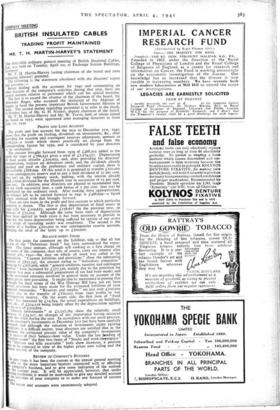BRITISH INSULATED CABLES
TRADING PROFIT MAINTAINED MR. T. H. MARTIN-HARVEY'S STATEMENT THE forty-fifth ordinary general meeting of British Insulated Cables, Ltd., was held on Tuesday, April 1st, at Exchange Station Buildings,
Liverpool. Mr. T. H. Martin-Harvey (acting chairman of the board and joint Mr. T. H. Martin-Harvey (acting chairman of the board and joint
managing director) presided.
The following is the statement circulated with the directors' report
and accounts:—
Before dealing with the accounts for 1940 and commenting on other features of the company's activities during that year, there are several matters relative to personnel which call for special mention. The first is to record the absence of the chairman of the board, Sir Alexander Roger, who accepted the invitation of the Minister of Supply to head the present important British Government Mission to India. The second matter regarding personnel is to refer to the death, in October last, of Mr. G. H. Nisbett, deputy chairman of the board. Mr. T. H. Martin-Harvey and Mr. W. Travis, both of whom joined the board in 1935, were appointed joint managing directors as from June ist, 1940. PROFIT AND Loss ACCOUNT The profit and loss account for the year to December 31st, 1940, shows that the profit on trading, dividends on investments, &c., after providing for taxation and contingent reserves adjustment, amount to k786,232—a result which shows practically no change from the corresponding figures for 1939, and is considered by your directors to be satisfactory.
The amount brought forward from 1939 of £488,305 added to the profit for 1940 of £786,232 gives a total of £1,274,537. Depreciation of fixed assets absorbs £209,622, and, after providing for directors' remuneration, interest on debenture stock, and the dividends already declared and paid on the preference and ordinary capital, there is left available £888,699. Of this total it is proposed to transfer Ltoo,000 to war contingencies reserve and to pay a final dividend of to per cent. (less tax) on the ordinary stock, making, with the interim already paid, a total dividend for the fifteenth year in succession of 55 per cent. tax). In addition, your directors are pleased to recommend that, or the sixth successive year, a cash bonus of 5 per cent. (less tax) be distributed on the ordinary stock. After making these appropriations, the balance left tp be carried forward to 1941 is £488,699—a figure almost identical with that brought forward. There are two items in the profit and loss account to which particular attention is drawn. The first 'is that depreciation of fixed assets in No calls for £209,622, against £158,617 for the previous year, an increase of £51,005. Although the same basic rates of depreciation have been applied in both years it has been necessary to provide in t940 for the extra depreciation being suffered by certain of our assets as a result of operating under war conditions. The second is the ansfer of a further Ltoo,000 to war contingencies reserve account, nging the total of the latter up to £200,000.
BALANCE-SHEET ITEMS
The first point for comment on the liabilities side is that all but i5oo of the " Debenture Stock " has been surrendered for repay- ent. The latter amount, although still ranking as a first charge on e assets of the company, does not, of course, carry any interest after annarY 4th, 1940—the date on which all stock was called in for edemption. " Current liabilities and provisions " show the substantial crease of £855,547, the amount owing to " Subsidiary companies " ng 11P by £277,906, while " general creditors, taxation and contingent es " have increased by £577,526, mainly due to the provision for lion (last year a substantial prepayment of tax had been made) and the increased amounts involved in general items on account of the eher prices now prevailing. It might also be mentioned in passing that ,hough the final terms of the War Damage Bill have not yet been -tied, provision has been made for the estimated liabilities of your party thereunder. " Reserves and surplus " are just over £100,000 gher, due to the transfer of £1700,000 from 1940 profits to war niingencies reserve. On the assets side, the first item of " fixed sets" has increased by £14,894, the actual expenditure on buildings,
&c., of £224,516 being largely offset by the depreciation applied the vear of £209,622.
"General investments " at £1,757,764 show the relatively small se of £34,307, no changes of any importance having occurred 15 this head during the year. In accordance with our usual practice, the company's investments at December 31st last have been carefully and although the valuation of investments undet existing nitions is a difficult matter, your directors are satisfied that in the egate the estimated present value of the company's investments In excess of their balance-sheet value. Under the last beading of ern assets" the first two items of "Stocks and work-in-progress" "Debtors and bills receivable " both show increases, a position Y to be expected in view of the higher prices now ruling and the ter activity of the company.
REVIEW OF COMPANY'S BUSINESS
In past years it has been the custom at the annual general meeting rein' to the more important 'matters connected with or affecting Pany's business, and to give some indication of the outlook fle current year. It will be appreciated, however, that under sting conditions it would be inadvisable to give any detailed account the activities of your company or to make any forecast of current ults. The report and accounts were unanimously adopted.


























 Previous page
Previous page